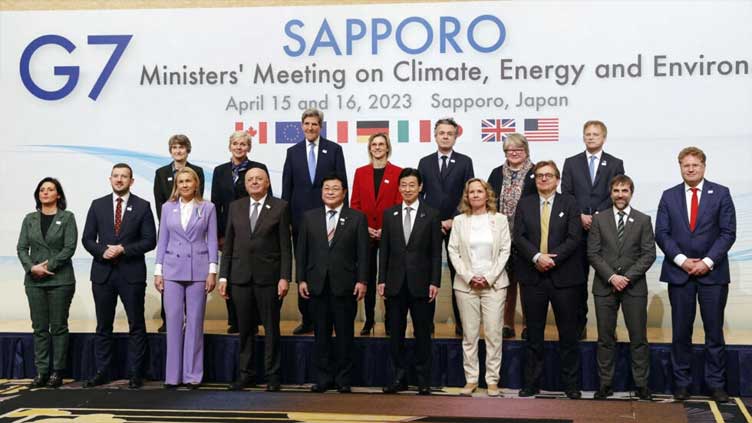G7 nations pledge ambitious goals for fossil fuel exit, plastic pollution

World
G7 nations pledge ambitious goals for fossil fuel exit, plastic pollution
(AFP) – The countries of the G7 group pledged on Sunday to "accelerate" their "exit" from fossil fuels in all sectors, but without setting a new deadline, and decided to jointly target zero new plastic pollution by 2040.
After two days of talks in the northern city of Sapporo, the bloc's climate and environment ministers vowed to "accelerate the phase-out of unabated fossil fuels so as to achieve net zero in energy systems by 2050 at the latest... and call on others to join us in taking the same action".
But they offered no new deadlines beyond last year's G7 pledge to largely end fossil fuel use in their electricity sectors by 2035.
France's energy transition minister Agnes Pannier-Runacher said the "phase-out" wording was nonetheless a "strong step forward" ahead of the G20 and COP28 summits.
Britain and France had put forward a new goal of ending "unabated" coal power – which does not take steps to offset emissions – in G7 electricity systems this decade.
But with global energy supplies still squeezed by the war in Ukraine, the target faced pushback from other members, including bloc president Japan and the United States.
Fear of backsliding on pledges
"I would obviously have liked to have been able to make a commitment to phase out coal by 2030," Pannier-Runacher told the French news agency AFP.
But "it is one issue on which we can still make progress in forthcoming discussions, particularly at COP28", the UN climate conference to be held in Dubai this November.
The Group of Seven industrialised nations, which also includes Germany, Italy, Canada and the EU, all target net-zero emissions by 2050 or sooner after signing the Paris Agreement to cap warming at well under 2 degrees Celsius, and ideally 1.5C.
The ministers had been under pressure to announce bold steps after a major UN climate report warned last month that 1.5C increases would be seen in about a decade without "rapid and far-reaching" action.
But campaigners expressed fears ahead of the talks that Japan, supported by Germany and others, could lead backsliding on pledges such as ending new overseas fossil fuel financing.
G7 leaders said last year that the "exceptional circumstances" of Russia's war in Ukraine made gas investments "appropriate as a temporary response".
Sunday's statement contains similar language, but also sets multiple parameters around such investments and highlights the "primary need" for "gas demand reduction".
Road map for the climate crisis
Still, climate campaigners warned that ambiguity sends the wrong message.
"The science is crystal clear that leaving the door open to investments in new gas or (liquefied natural gas) leaves the G7 off track for 1.5C," said Laurie van der Burg of Oil Change International.
Japan's energy minister Yasutoshi Nishimura nonetheless characterised the communique as "ambitious" and praised the G7 for "recognising diverse paths towards carbon neutrality" during the energy crisis.
Fatih Birol, executive director of the International Energy Agency, told AFP he was pleased with the statement.
"It combines our current energy security concerns and it also provides a road map on how we deal with the climate crisis," he said, adding that Japan had played a "responsible and constructive" role.
The bloc however stopped short of endorsing Japan's strategy of burning hydrogen and ammonia alongside fossil fuels to reduce emissions, which activists say only serves to extend the lifespan of polluting plants.
Its statement simply notes that "some countries are exploring" the potential of hydrogen fuels, adding that this should be "aligned with a 1.5C pathway".
Move on plastic pollution
G7 nations on Sunday also committed to eliminating plastic pollution by 2040, an attainable goal thanks to the rise of the circular economy and the reduction or banning of single-use plastics and non-recyclables, according to Sunday's statement.
Global plastic production almost doubled between 2000 and 2019, from 234 million tonnes to 460 million tonnes, according to the Organisation for Economic Co-operation and Development (OECD).
Plastic waste more than doubled in that time, reaching 353 million tonnes in 2019.
But global production fell slightly in 2020 due to the coronavirus pandemic for only the third time in the history of modern industry, according to the trade association Plastics Europe.
Plastic makes up at least 85 percent of total marine waste, according to the UN Environment Assembly.
A year ago in Nairobi, 175 countries convened to put an end to plastic pollution worldwide by developing a legally-binding United Nations treaty by the end of 2024. The next session to negotiate the treaty is scheduled for May in Paris.
Among the anticipated measures is a global ban on single-use plastics, the establishment of a "polluter-pays" system and a tax on the production of new plastic.

